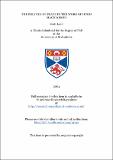Files in this item
The politics of place in the work of Hugh MacDiarmid
Item metadata
| dc.contributor.advisor | Crawford, Robert | |
| dc.contributor.advisor | Dunn, Douglas | |
| dc.contributor.author | Lyall, Scott | |
| dc.coverage.spatial | vii, 335 p. | en_US |
| dc.date.accessioned | 2018-06-29T12:55:51Z | |
| dc.date.available | 2018-06-29T12:55:51Z | |
| dc.date.issued | 2004 | |
| dc.identifier.uri | https://hdl.handle.net/10023/14752 | |
| dc.description.abstract | 'The Politics of Place in the Work of Hugh MacDiarmid' argues that there is no fundamental contradiction in MacDiarmid's politics, his Scottish nationalism and international communism issuing in a radical Scottish Republicanism that synchronizes the local and universal, seeking to unify the cultural and political divisions of Scotland. This thesis suggests that MacDiarmid challenges the metropolitan location of culture through a provincialist poetry and politics energized and exasperated by intimate relationship with home. It analyses the connections between MacDiarmid's ideological valorization of difference and the Scottish places from which his politics evolve. Chapter One suggests that modem Scottish cultural politics is still thirled to the imperialistic dualities of the metropolitan Scottish Enlightenment. MacDiarmid's strategic essentialism reasserts an autonomous cultural and political practice that aims to make Scotland whole. The chapter traces MacDiarmid's communism to his defiance of the churchy parochialism of Langholm. Using uncollected newspaper material, Chapters Two and Three illustrate the internationalism of MacDiarmid's localism in Montrose and Whalsay. From examining how engagement with specific places shapes MacDiarmid's politics. Chapter Four returns to analysis of the ideological construction of Scotland. The chapter explores how education has formed ideas of Scotland crucial to its political position and bound up with the specialized Scottish educational system's suppression of a Scottish Republican tradition, whose energies MacDiarmid uncovers and endeavours to release through an autodidactic generalism. Prioritizing this particularity of local culture. Chapter Five argues that the apparent contradictions in the modernist MacDiarmid's politics are best understood in terms of global capitalism's construction of mass culture, a division of labour he opposes through an internationalist poetry of generalist knowledge. This thesis finds theoretical alliance with the internationalism of Marxism and postcolonialism, synthesizing these with an autochthonous critical apparatus, declaring Hugh MacDiarmid a major modem component of a tradition of radical Scottish Republicanism. | en_US |
| dc.language.iso | en | en_US |
| dc.publisher | University of St Andrews | |
| dc.subject.lcc | PR6013.R5Z5L8 | |
| dc.subject.lcsh | MacDiarmid, Hugh, 1892-1978--Political and social views | en |
| dc.subject.lcsh | MacDiarmid, Hugh, 1892-1978--Criticism and interpretation | en |
| dc.subject.lcsh | Politics and literature--Scotland--History--20th century | en |
| dc.subject.lcsh | Politics in literature | en |
| dc.subject.lcsh | Scotland--In literature | en |
| dc.subject.lcsh | Setting (Literature) | en |
| dc.subject.lcsh | Place (Philosophy) in literature | en |
| dc.title | The politics of place in the work of Hugh MacDiarmid | en_US |
| dc.type | Thesis | en_US |
| dc.contributor.sponsor | Carnegie Trust for the Universities of Scotland | en_US |
| dc.type.qualificationlevel | Doctoral | en_US |
| dc.type.qualificationname | PhD Doctor of Philosophy | en_US |
| dc.publisher.institution | The University of St Andrews | en_US |
This item appears in the following Collection(s)
Items in the St Andrews Research Repository are protected by copyright, with all rights reserved, unless otherwise indicated.

